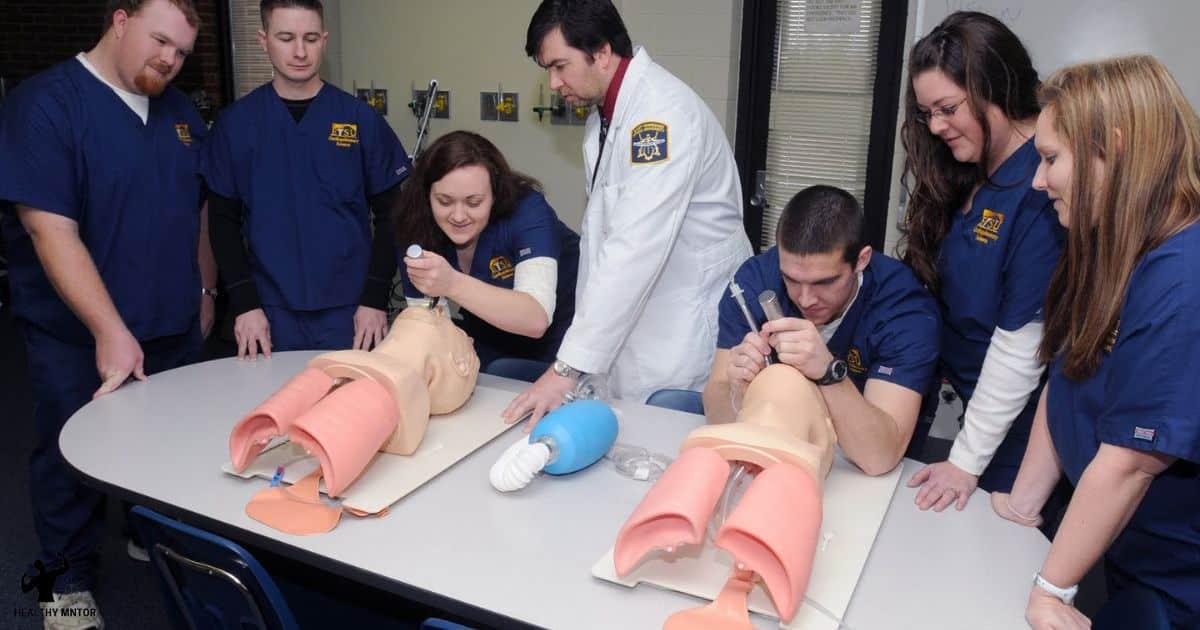Are you a health science graduate wondering about the multitude of possibilities that await? Look no further! This article explores the exciting career options, potential for medical school, and the benefits of pursuing an online degree in health science. Discover the salary expectations and gain a comprehensive understanding of this dynamic field. Uncover job opportunities and factors to consider before embarking on your health science journey. Join us as we explore the world of health science and the endless opportunities it holds.
Key Takeaways
- Healthcare administration, health education, medical and health services management, research scientist, and public health specialist are potential career options for individuals with a bachelor’s degree in health science.
- Preparation for medical school includes completing required science courses, performing well on the MCAT, engaging in extracurricular activities and experiences, understanding admissions requirements, and crafting a compelling personal statement and securing strong letters of recommendation.
- Pursuing an online degree in health science offers convenience, flexibility, access to resources and support, and the ability to balance work and other commitments.
- Health science graduates can expect competitive salaries, with average salaries ranging from $46,910 per year for health educators to $104,280 per year for medical and health services managers. The growing demand for healthcare professionals contributes to higher earning potential.
Exploring Career Options
When considering career options, it is essential for individuals with a Bachelor’s in Health Science to thoroughly explore a wide range of opportunities. With this degree, graduates have the advantage of entering various fields within the healthcare industry. One possible career path is healthcare administration, where individuals can work in hospitals, clinics, or government agencies to oversee operations and manage healthcare facilities. Another option is becoming a health educator, where individuals can educate communities and individuals on health-related topics, helping to improve overall wellbeing. Additionally, graduates can pursue roles as medical and health services managers, where they can plan, direct, and coordinate medical services in hospitals or other healthcare organizations. The field of health science offers a multitude of career paths, providing individuals with the opportunity to make a meaningful impact on the health and well-being of others.
Preparing for Medical School
One of the key steps in preparing for medical school, and ensuring a smooth transition to your future career in healthcare, is to gain extensive knowledge of the admissions requirements and process, including a thorough understanding of the “Health Insurance Plan.” It is important for aspiring medical students to understand what is expected of them and how they can best showcase their skills and qualifications. Here are three important things to consider when preparing for medical school:
- Academic prerequisites: Medical schools typically require applicants to have completed certain science courses, such as biology, chemistry, and physics. It is essential to ensure that you have taken these courses and have performed well academically.
- Medical College Admission Test (MCAT): The MCAT is a standardized exam that assesses an applicant’s knowledge and skills in areas such as biology, chemistry, and critical thinking. Preparing for and performing well on the MCAT is a crucial step in the medical school application process.
- Extracurricular activities and experiences: Medical schools value applicants who have demonstrated a commitment to helping others and have gained relevant experience in healthcare settings. Engaging in volunteer work, shadowing physicians, and participating in research projects can greatly enhance your medical school application.
Considering an Online Degree
If you are considering pursuing a bachelor’s degree in health science, it may be worth exploring the option of earning your degree online. Online degree programs offer convenience and flexibility, allowing you to study at your own pace and from the comfort of your own home. This can be particularly beneficial for individuals who are already working or have other commitments. In addition, online programs often provide a wide range of resources and support, including virtual classrooms, discussion forums, and access to faculty members. It is important to note that online degrees in health science are just as reputable as traditional degrees, as long as the program is accredited. Before enrolling in an online program, be sure to research and compare different institutions to find the one that best fits your needs and goals.
Salary Expectations for Health Science Graduates
Many health science graduates with a Bachelors in Health Science can expect to earn competitive salaries in a variety of healthcare-related professions. The demand for professionals in the healthcare industry is on the rise, leading to increased opportunities and higher earning potential for those with a bachelor’s degree in health science. Here are three potential salary expectations for health science graduates:
- Health Educators: Health educators play a vital role in promoting wellness and disease prevention. With a bachelor’s degree in health science, graduates can expect to earn an average salary of $46,910 per year, according to the Bureau of Labor Statistics.
- Medical and Health Services Managers: These professionals oversee the operations of healthcare facilities and ensure the delivery of quality care. With a bachelor’s degree in health science, graduates can earn an average annual salary of $104,280, according to the Bureau of Labor Statistics.
- Occupational Health and Safety Specialists: These specialists work to prevent and eliminate workplace hazards. With a bachelor’s degree in health science, graduates can earn an average salary of $77,510 per year, according to the Bureau of Labor Statistics.
With a bachelor’s degree in health science, graduates have the potential to earn competitive salaries in a variety of healthcare-related professions. As the demand for healthcare professionals continues to grow, the earning potential for health science graduates is expected to increase as well.
Understanding Health Science as a Field
The field of health science encompasses a wide range of disciplines and professions, all aimed at improving and maintaining the health and well-being of individuals and communities. It is a multidisciplinary field that combines knowledge from various sciences, including biology, chemistry, anatomy, and physiology, to understand the human body and its interactions with the environment. Health science professionals work in diverse settings such as hospitals, clinics, research laboratories, public health agencies, and community organizations. They may be involved in conducting research, developing and implementing health programs, providing direct patient care, or educating individuals and communities about health and disease prevention. Understanding health science as a field is essential for individuals considering a career in this area, as it provides the foundation for the many job opportunities available.
Job Opportunities in Health Science
There are numerous job opportunities in health science for individuals with a bachelor’s degree in the field. Here are three potential career paths for graduates:
- Health Educator: As a health educator, you will work to promote healthy behaviors and provide information to individuals and communities. You will develop programs, conduct workshops, and collaborate with healthcare professionals to create educational materials.
- Public Health Analyst: In this role, you will collect and analyze data to identify trends and patterns in public health. You will work with government agencies and organizations to develop strategies for improving population health and preventing diseases.
- Healthcare Administrator: As a healthcare administrator, you will manage the operations of healthcare facilities. This includes overseeing budgets, ensuring compliance with regulations, and coordinating with medical staff to provide quality patient care.
These are just a few examples of the job opportunities available in health science. With a bachelor’s degree in this field, you can find meaningful and rewarding careers that contribute to the well-being of individuals and communities.
Factors to Consider Before Pursuing Health Science Studies
Before embarking on a journey to pursue health science studies, it is crucial to carefully assess your interests, strengths, and career goals. This will ensure that you make an informed decision and choose a path that aligns with your passions and aspirations. Consider the various specializations within health science, such as public health, healthcare management, or clinical research, and determine which area resonates with you the most. Additionally, evaluate your academic strengths and determine if you have the necessary skills and aptitude for a career in health science. It is also important to consider the job prospects and demand for health science professionals in your desired field. Finally, reflect on your long-term career goals and how a bachelor’s degree in health science can help you achieve them. By carefully considering these factors, you can make a well-informed decision about pursuing health science studies.
FAQ’s
What Are the Prerequisites for Medical School?
The prerequisites for medical school typically include a bachelor’s degree, completion of specific science courses (such as biology, chemistry, and physics), a competitive GPA, satisfactory scores on the MCAT exam, and relevant clinical experience.
Can I Pursue a Career in Health Science Without a Bachelor’s Degree?
While a bachelor’s degree in health science can provide a strong foundation for various healthcare careers, it is possible to pursue a career in health science without a bachelor’s degree through obtaining relevant certifications or pursuing specialized training programs.
What Are Some Alternative Career Options for Health Science Graduates?
With a bachelor’s in health science, graduates have a variety of alternative career options to explore. These may include roles in healthcare management, public health, research, pharmaceuticals, or further education in specialized areas such as nursing or physical therapy.
Is There a Demand for Health Science Professionals in Rural Areas?
There is a demand for health science professionals in rural areas due to limited access to healthcare services. These professionals can contribute to improving the health outcomes and addressing the healthcare disparities in these underserved communities.
How Long Does It Typically Take to Complete an Online Health Science Degree Program?
Completing an online health science degree program typically takes around four years. This program equips students with the knowledge and skills necessary to pursue various roles in the healthcare industry, such as health educators, research assistants, or community health workers.
Conclusion
In conclusion, a bachelor’s degree in health science opens up a wide range of career opportunities in various fields such as healthcare administration, public health, research, and clinical practice. It also serves as a stepping stone for those considering further education in medical school. By considering factors such as salary expectations and the flexibility of online degree options, individuals can make informed decisions about pursuing health science studies. Ultimately, this degree provides a solid foundation for professionals to make a positive impact on the health and well-being of individuals and communities.







